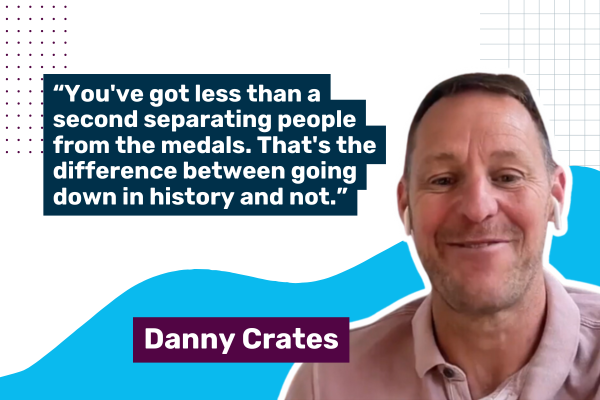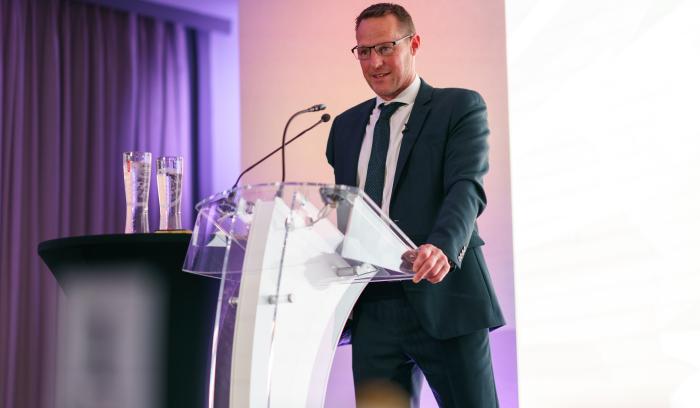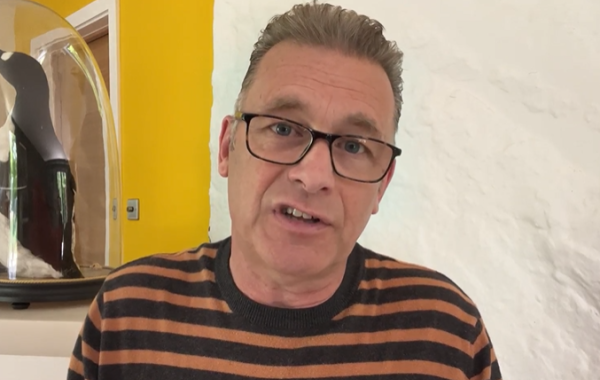On the eve of the Paris 2024 Olympic and Paralympic Games, Danny kindly took time to speak to National Numeracy's Louise Purser about the link between sport and numbers, from the difference a hundredth of a second can make to winning a race and not, to the behind-the-scenes hours of training that go into a successful athletics career.
He also told us how he uses numbers in everyday life and about the importance of self-belief and confidence – just as with sport, with numeracy you can gradually improve with practice.
What was your experience with maths like at school?
At school I was like many sports people – I was better outside than I was inside, but I was quite good at maths.
I actually chose Accountancy as a GCSE option because I enjoyed maths, but I just could not engage with it and absolutely flunked that one. But I did enjoy maths and I got a B at GCSE. I can't remember any of it, but I did enjoy it!
Do you help your children with their maths homework?
I would love to say yes, but I'm not very good at doing the homework with the children. My fiancée, Gemma, works in education and is much better placed for doing the homework with the children than I am. I've got two sons and a daughter.
One of my sons has just finished his GCSEs and the other is 14, so the level of maths they're at is way beyond what I can remember.
My daughter is going to start school in a year and a half, I might be able to help with her very basic Reception-level maths though, I'll probably be alright with that!
How are numbers used in athletics?
In athletics it’s all about time. Races are broken down, especially the 400 metres, which is very individually raced. Even though you're running on a track with seven other people, you run your own race and it's so precise, you're going through every 50-metre marker at a set time.
And we’re not just talking, ‘so you go through the first 50 metres or the first 100 metres and it’s round about 13, 14 seconds, it’s whatever it looks like.’ It’s not ‘round about’ that, it will be precise.
I had an exact time that I had to try and get through the 200-metre mark on. And if I remember rightly, it was about 24.7 seconds. And if I venture too far either side of that, my race is done. I had to get through the 50, the 100, the 150 markers all at exact split times.
So we're breaking it down all the time. Then we're always using the data in training as well to get us to those points. And within training, we're doing weight training, we're doing strength conditioning training.
We are using all these number-based data to get us to a point where we can race.
I didn’t run a long-distance race, so I didn't have all my splits written on the back of my hand like you'd see with an endurance athlete, ours are quite precise and short, but it's ingrained in your head and you're always playing with this data, you're always trying to tweak it. If you're going to knock half a second off your personal best, it's: where are you going to get it from? We’re always doing the maths in our head while we're racing.
How important are small numbers in athletics?
In track and field we deal in hundredths of a second.
People watch me win the Athens 800-metre final and they think I absolutely smashed that race. I won it, but it was less than a second that separated me and Samir Nouioua, who won silver.
And if you think about my 400-metre final race in Sydney, when I came away with a bronze medal, there was 0.22 of a second between gold, silver and bronze.
We are talking quarters, eighths of seconds that are separating us and that's after you've run half a mile, in the 800 metres.
You’ve run half a mile and then you've got less than a second, or half a second separating people from the medals.
That's the difference between winning the medal and not winning the medal. That's the difference between going down in history and not going down in history.
That's the difference between losing all your funding and being struck off the program and staying on the program and getting your funding. It's really important.
You ran in races that lasted less than two minutes, but tell us about the numbers and the training behind those races.
It is crazy. I had a 12-year international athletics career, and what I’m remembered for is a one minute, 57 second race – the Athens final. But built around that one minute, 57 seconds was 12 years, was tens of thousands of hours in training, hundreds and hundreds and hundreds of races, won and lost.
There were injuries, there were setbacks, there was illness, there were successes – it's all in there and people don't always see that.
People often say that you have to make sacrifices in sport. I never used that word in my sport. I always said there were life choices. I chose to be an athlete. I chose to not go away on holidays with friends. I chose to not be able to go to birthday parties because I was away training. They were life choices that I lived by and I enjoyed.
But all that sits behind the scenes. There's so much that goes on in the background and that's the difference between winning and losing – whether you're prepared to do the extra mile. It's not just about running, it's about putting everything together to enable you to be the best runner that you can be.
You can take something that seems quite complex and unachievable and by using numbers, you can make it sound really simple.
I talk about how I had to find four seconds over four years and four seconds doesn't sound like a lot, but we deal in hundredths of a second in track and field.
Four seconds is the distance on the track and, if you think about it, I'm already training hard, as hard as I possibly can.
I'm already putting in 12 to 14 training sessions a week, six days a week, 11 months of the year. I can't add more training in. So how am I going to find four seconds? It's unsurmountable, it's unachievable almost. So we broke it down and we broke it down and we broke it down and we got it down to a point where we thought, right, actually, if I can get a quarter of a second faster every 12 weeks, then potentially by the time I get to Athens I can race for a gold medal.
And so a quarter of a second every 12 weeks suddenly sounds very achievable. So you're actually using the numbers element to it to take something that seems quite complex and difficult to in your head make it sound really easy. Obviously what had to go into place is the complex part to enable me to do it.
When I first went back to athletics after my accident and after playing rugby, I didn't suddenly jump in and say: “Right, I'm going to try and be a Paralympian.”
It was a gradual process, otherwise I wouldn't have sustained it. I started off training at my local athletics club, training two or three times a week. Then as I started to see the progression from that, I started to say: “OK, so what can I add in now to try and give me a better opportunity to become an international athlete?”
Then I eventually got my first GB vest and then it was: “OK, so now what can I improve on to give me the opportunity to stand on a podium because that looks a lot more fun?”
So it was quite progressive. It was the same with how I approached my nutrition, my rest and things like that and my medical backup. I didn't just start on day one, living life as the perfect athlete. I don't think I ever was the perfect athlete in terms of everything, but I didn't try and do that on day one.
You don't learn GCSE maths in Reception. You learn the very basic foundations and then it just gets added to, built on. Then it just grows and grows as your confidence and your experience and ability to do it grows. You gradually move forward, so it is incremental. It's bit by bit.
As I was improving, I was able to commit more to being like an athlete until I eventually went from somebody that trained like an athlete to becoming an athlete. When I became an athlete, that's when it's everything. It's your whole focus, your whole thought process is around living and breathing and being an athlete to enable you to deliver a performance. That's when I was in a position where I was then going to start racing for the medals.
What would be your advice to anyone who says they'll never be able to understand numbers?
I think, for anyone who says they’ll never be able to do something, numbers or anything really, whenever I work with anybody like that, I say: “So where's the evidence? What's the evidence that you will never be any good with that? What's the evidence that you can't do it?”
You’ll soon find times when they have done that thing, and then they say: “So I can do it!”
Then you can start looking at the confidence. So you have done it before. OK, so now we can be confident that we can do it again, right? We just might need to put some other things in place to help you do it.
When people say: “Maths is hard” or “Science is hard,” I say it's only hard because you don't know the answer, or you don't know how to get the answer.
If someone's saying they can't do really complex equations, maybe that takes a little bit more practice, but you'll always be able to do it. You’ve just got to know how to do it.
Self-belief and confidence come from doing things or having done things.









